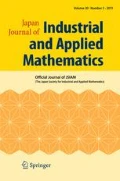Abstract
Let A be a finite-dimensional algebra over an algebraically closed field \(\Bbbk \). For any finite-dimensional A-module M we give a general formula that computes the indecomposable decomposition of M without decomposing it, for which we use the knowledge of AR-quivers that are already computed in many cases. The proof of the formula here is much simpler than that in a prior literature by Dowbor and Mróz. As an example we apply this formula to the Kronecker algebra A and give an explicit formula to compute the indecomposable decomposition of M, which enables us to make a computer program.
Similar content being viewed by others
References
Anderson, F.W., Fuller, K.R.: Rings and categories of modules. Second edition. Graduate Texts in Mathematics, 13. Springer, New York (1992)
Assem, I., Simson, D., Skowroński, A.: Elements of the representation theory of associative algebras. Vol. 1. Techniques of representation theory. London Mathematical Society Student Texts, 65. Cambridge University Press, Cambridge (2006)
Auslander, M., Reiten, I.: Representation theory of Artin algebras, VI, A functorial approach to almost split sequences. Commun. Algebra 6(3), 257–300 (1978)
Carlsson, G.: Topology and data. Bull. Am. Math. Soc. (N.S.) 46(2), 255–308 (2009)
Carlsson, G., de Silva, V.: Zigzag persistence. Found. Comput. Math. 10, 367–405 (2010)
Dowbor, P., Mróz, A.: The multiplicity problem for indecomposable decompositions of modules over a finite-dimensional algebra. Algorithms and a computer algebra approach. Colloq. Math. 107(2), 221–261 (2007)
Escolar, E.G., Hiraoka, Y.: Persistence modules on commutative ladders of finite type. Discrete Comput. Geom. 55(1), 100–157 (2016)
Iwata, S., Shimizu, R.: Combinatorial analysis of singular matrix pencils. SIAM J. Matrix Anal. Appl. 29(1), 245–259 (electronic) (2006/07)
Oudot, Steve Y.: Persistence theory: from quiver representations to data analysis. Mathematical Surveys and Monographs, 209. American Mathematical Society, Providence, RI (2015)
Ringel, C.M.: Tame algebras and integral quadratic forms. Lecture Notes in Mathematics, vol. 1099. Springer, Berlin (1984)
Zomorodian, A., Carlsson, G.: Computing persistent homology. Discrete Comput. Geom. 33, 249–274 (2004)
Acknowledgements
The starting idea was made when the first named author was at the lecture on the Kronecker canonical form of singular mixed matrix pencils by S. Iwata at CREST meeting in February, 2016. In fact, later we recognized that Iwata–Shimizu [8] had given relationships between values of ranks \(p_n(M)\) (resp. \(i_n(M), r_n(0, M)\), and \(r_n(\infty , M)\)) in Definition 2 and the values of \(\varvec{d}_M(L)\) for \(L = P_n\) (resp. \(I_n, R_n(0)\), and \(R_n(\infty )\)) in Theorem 2. However, they did not mention regular indecomposables \(R_n(\lambda )\) with \(\lambda \ne 0, \infty \). The authors would like to thank S. Iwata for his lecture and M. Takamatsu for informing us of the paper [8]. After submitting the paper E. Escolar and the referee pointed out that the paper [6] is already published dealing with the same problem with similar results, for which we are very thankful. This work is partially supported by Grant-in-Aid for Scientific Research 25610003 and 25287001 from JSPS (Japan Society for the Promotion of Science), and by JST (Japan Science and Technology Agency) CREST Mathematics (15656429).
Author information
Authors and Affiliations
Corresponding author
About this article
Cite this article
Asashiba, H., Nakashima, K. & Yoshiwaki, M. Decomposition theory of modules: the case of Kronecker algebra. Japan J. Indust. Appl. Math. 34, 489–507 (2017). https://doi.org/10.1007/s13160-017-0247-y
Received:
Revised:
Published:
Issue Date:
DOI: https://doi.org/10.1007/s13160-017-0247-y


